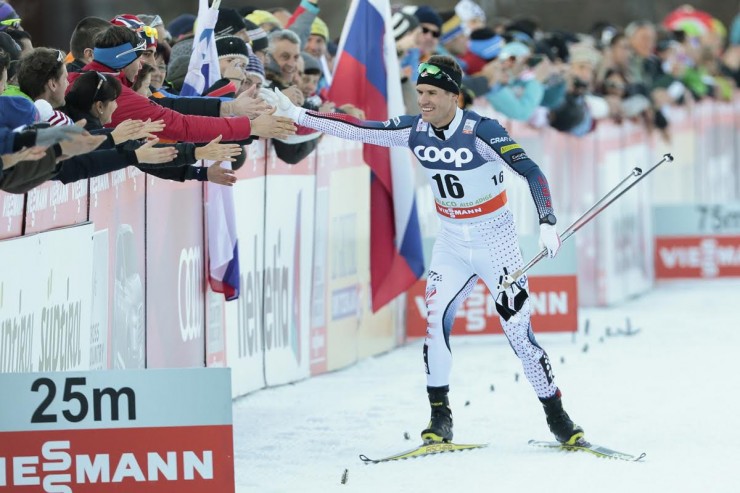
There’s been a building feeling. A notion that the U.S. men’s sprint team just needed a little bit of luck — like no broken poles, fast skis, good health, and a course suiting their mega-horsepower skiers. The men’s World Cup freestyle sprint on Saturday in Toblach, Italy, offered all that up.
Simi Hamilton’s skiing during the sprint rounds could be described as the following: he skied fast and he skied smart. In the end, only one skier proved faster.
Italy’s Federico Pellegrino won the 1.3-kilometer skate sprint on Italian soil in 2:29.57. Pellegrino, a not-so-uncommon sight on freestyle sprint podiums, won last weekend’s sprint in Davos. A U.S. Ski Team sprinter, Hamilton placed second (+0.48) while Andrew Young skied to a historic third for Great Britain (+0.84).
It doesn’t take a sprint-results savant to note that Norway was nudged off the podium. Swiss skier Jovian Hediger placed fourth (+1.09), while Norway’s Finn Hågen Krogh captured fifth (+1.44) and teammate Sondre Turvoll Fossli ended up sixth (+11.98).
To his standards, Pellegrino began the day modestly, racing to seventh in the qualifier, 1.89 seconds behind Krogh, the fastest in qualifying in 2:28.76. From there, the overall Sprint World Cup leader played cat-and-mouse tactics to win his quarterfinal and semifinal en route to his victory in the final.
Hamilton’s First Non-Stage Podium
Prior to Saturday’s second place, Hamilton’s only other World Cup podium came in December 2013, when he won a Tour de Ski freestyle sprint in Lenzerheide, Switzerland. The U.S. men had reached the podium in a World Cup sprint five times before: once with Hamilton, three times with teammate Andy Newell and once with Torin Koos, according to a USSA press release.
Last weekend in Davos, Switzerland, after qualifying 10th, Hamilton felt primed for another shot, but a broken pole in his quarterfinal snuffed out a potential top-10 result. Hamilton finished within the points in 23rd overall.
“I think after the last weekend I was feeling really good in Davos. My energy was great, I’ve been healthy and then I kind of had that pole mishap in the quarter in Davos,” Hamilton said in a post-race phone interview. “So that was pretty frustrating for me last weekend. I knew that I wanted to put something together for this weekend.”
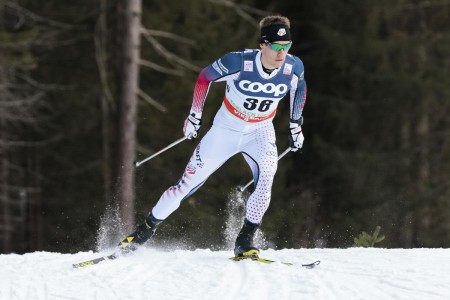
“You know skate skiing is one of my strengths, my best thing, and we had one on the schedule and it got me fired up,” he added.
Hailing from the thin air of Aspen, Colo., Hamilton is no stranger to a lack of oxygen. So Toblach’s altitude, some 4,500 feet above sea level, wasn’t a deterrent. And the course, featuring several technical corners, and a climb with a long glide out into the finish played to Hamilton’s smarts, patience and peak form.
“I’m pretty psyched for sure about the day, a lot of things just came together for me. Not too much to complain about,” he said.
In Toblach’s loaded field, a relaxed-and-efficient Hamilton qualified 16th, 3.14 seconds behind Krogh. He then selected the first quarterfinal, which featured heavyweights Petter Northug Jr. and Erik Brandsdal.
In that initial heat, Hamilton tested his slow-burn strategy of waiting until the final hill and long glide out to play his cards.
“The real defining characteristic is the downhill; it’s so long and straight that there are always these massive slingshots that happen,” U.S. Ski Team Head Coach Chris Grover explained on the phone. “It can be a disadvantage to be in the lead because people in second or third are always popping out and slingshotting.
“So one of the key factors with this course is that having a fast start is not critical at all,” he added. “And you typically see people that relax in the beginning, hover back in fourth, fifth, sixth place during the first lap, then they use a slingshot coming off the building or coming off the downhill to move up in their placing. So people that often try to hammer off the front early, they end up getting burned at the end.”
Hamilton did the burning. He waited and waited, skiing mostly in the rear of the pack, exploiting his masterful glide. Going head-to-head with Northug on the final climb, Hamilton descended in first and took the arcing left turn into the final straightaway tight on the inside.
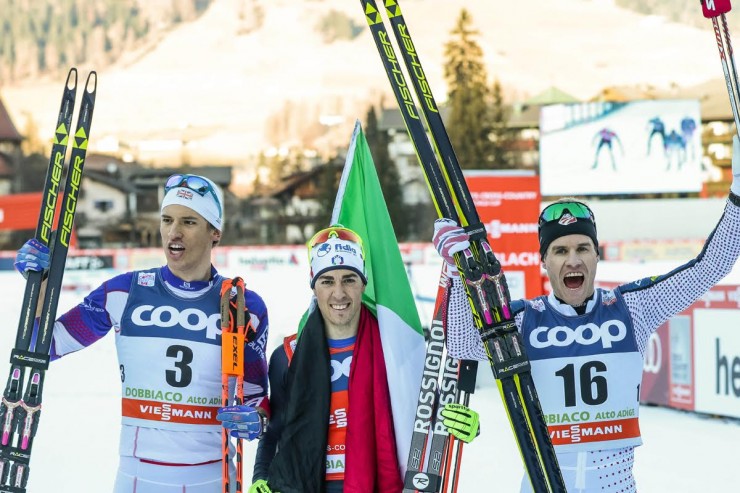
“I felt like every time, coming down the really long, straight downhill towards the finish and a little short set one coming off the building hill, I just I was drifting up on people,” Hamilton said of his skis.
At the finish, with Northug barely ahead, Brandsdal and Hamilton toed the line in a photo finish, 0.16 seconds behind Northug, with Hamilton eventually declared the second-place finisher. As one of the slower quarterfinals, Hamilton eked into the semifinals.
The semis were a tactical repeat for Hamilton.
“He waited until he had an opening and he had momentum coming off one of the hills each time, and he just moved up and moved up,” Grover said. “So he tried to hammer over the top of the last uphill and gain a little space over the down; enough of a space where people can’t draft you too tight and can’t come around you. Every single quarterfinal, semifinal, final, he utilized that same strategy.”
Hamilton finished second again (+0.24), this time to eventual-overall winner Pellegrino.
His plan worked: lurk and maintain energy reserves for a big push on the last climb, and glide out on his fast boards.
“Essentially going into the final, I knew that my game plan had worked pretty well during the day thus far. If it ain’t broke, don’t fix it,” Hamilton said.
Lining up in a sprint final next to Pellegrino and last year’s overall sprint champion, Krogh, is no joke. Yet, Hamilton had been skiing like he belonged. He took a deep deep breath, sliding his skis back and forth at the start.
“Going into the final, I knew that my game plan had worked pretty well during the day thus far. If it ain’t broke, don’t fix it.”— Simi Hamilton, 28, U.S. Ski Team veteran sprinter after placing second in Saturday’s World Cup freestyle sprint in Toblach, Italy
No skier took lead-out responsibilities. For much of the final, it remained a tactical race. Then things began to blow apart.
“And you know we stayed together all the way into the ‘building hill,’and I was kind of skiing right behind Finn on that hill and he had a little bit of a trip,” Hamilton recalled. “I was behind him just far enough that I was able to kind of dodge him go around him.”
Atop the hill, Pellegrino, Young and Hamilton made a slight gap.
“At that point, Pellegrino and I think Andy Young and I were just three guys right at the top of the building hill there, and I just focused on skiing that really hard,” Hamilton said. “Because the first half of the final wasn’t at a super-hot pace, I knew that I still had a lot of energy for that last hill.”
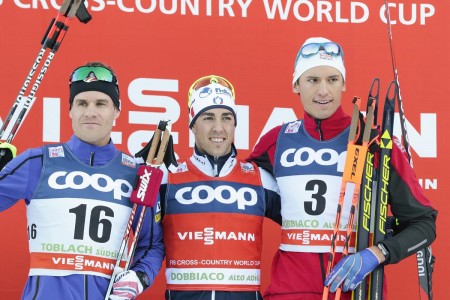
On the last hill, Hamilton powered into first. That can be a risk. Coming off the last hill, it’s common for those drafting behind the leader to slingshot around, and gain positions on the flats.
“On this course especially, it’s always a risk to try to jump in front going into that really long downhill, but I knew that podium would be amazing for me today,” he said. “That’s what I was gunning for, and I knew if I skied up and over that final climb super hard and got into a really low tuck, I knew that the chances of drifting out of the top three were pretty slim. So I just went for it from there and Pellegrino skied in my draft behind me.”
Pellegrino did slingshot around, but Hamilton skied unfazed on the final stretch, securing second place.
Although it’s been a long time coming, success for Hamilton finds him in a good place.
“It really comes down to what makes me super happy, and that’s skiing really fast on a sunny day and in beautiful places, with lots of great fans on a short course, skating especially. And I think that when all those things come together, I get really fired up,” he said.
For Hamilton, Saturday was one of those days.
“I knew that podium would be amazing for me today. That’s what I was gunning for.” — Hamilton
Newell, who qualified 13th (+2.74), was the only other U.S. skier entered in the sprint. Having caught a cold before last weekend’s races, Newell said he didn’t feel 100 percent. He finished fourth in his quarterfinal on Saturday for 27th overall.
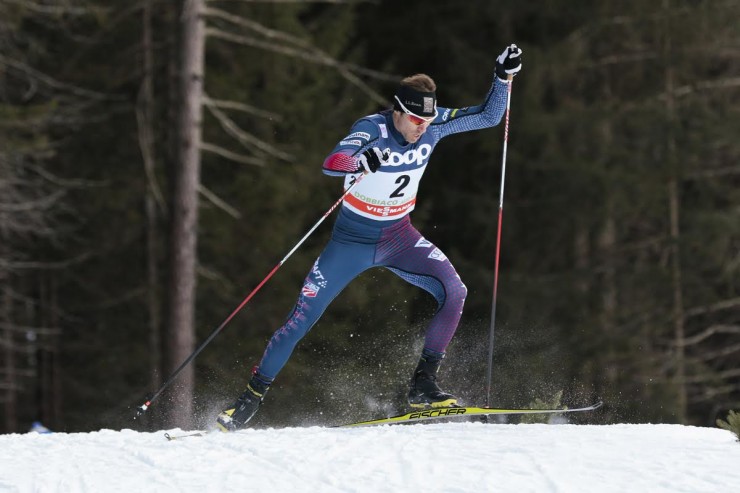
Led by Hediger as the winner of his heat, Newell’s quarterfinal was a tight one — with all six men finishing within a second of one another. The winning time ranked third-fastest of five quarterfinals, with Hediger edging Austria’s Bernhard Tritscher in a photo finish for first. Sweden’s Simon Persson placed third (+0.35) in the heat, Norway’s Ola Vigen Hattestad (+0.32) was fourth (+0.48), and Norway’s Pål Golberg finished fifth (+0.87), less than two-tenths of a second ahead of Newell.
“I went out there today and thought I was felling pretty good. But I didn’t quite have that final gear in the finishing stretch. Qualification went fine…It wasn’t a great day for me. Sometime these courses are hard for me. It’s definitely a big tactics course, it’s all about drafting into the finish. It’s all about slingshotting on a course like this…And for me, as a smaller lighter kind of guy, I tend to struggle on sprints that come down to the final downhill a little bit,” said Newell.
The U.S. sprinter planned to race Sunday’s 15 k classic individual start in Toblach, the last race before a World Cup holiday break.
“I’m feeling pretty good about tomorrow’s race. I don’t really know what to expect. It’s a 15 k classic, and I’m leaning towards double poling the course,” Newell said in a phone call. “That will be a first for me on the World Cup. It’ll be interesting to see what happens.”
Jason Albert
Jason lives in Bend, Ore., and can often be seen chasing his two boys around town. He’s a self-proclaimed audio geek. That all started back in the early 1990s when he convinced a naive public radio editor he should report a story from Alaska’s, Ruth Gorge. Now, Jason’s common companion is his field-recording gear.



